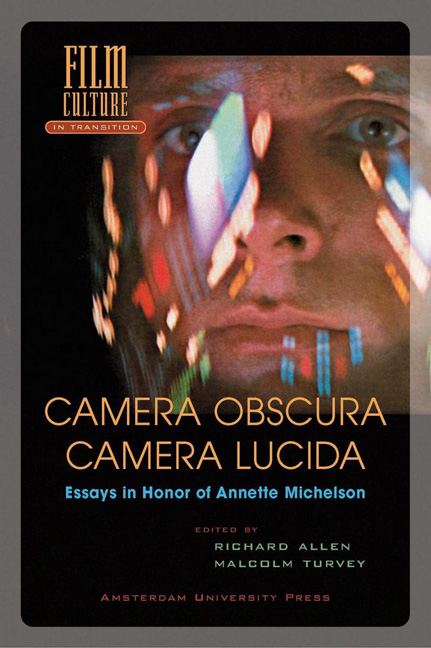Book contents
- Frontmatter
- Contents
- Acknowledgements
- Preface
- Introduction
- The Logic of an Illusion: Notes on the Genealogy of Intellectual Cinema
- Narcissistic Machines and Erotic Prostheses
- Loïe Fuller and the Art of Motion: Body, Light, Electricity and the Origins of Cinema
- Visitings of Awful Promise: The Cinema Seen from Etna
- Transfiguring the Urban Gray: László Moholy-Nagy’s Film Scenario ‘Dynamic of the Metropolis’
- Eisenstein’s Philosophy of Film
- Knight’s Moves
- Hitchcock and Narrative Suspense: Theory and Practice
- From the Air: A Genealogy of Antonioni’s Modernism
- Dr. Strangelove: or: the Apparatus of Nuclear Warfare
- Collection and Recollection: On Film Itineraries and Museum Walks
- Afterward: A Matter of Time: Analog Versus Digital, the Perennial Question of Shifting Technology and Its Implications for an Experimental Filmmaker’s Odyssey
- Select Bibliography
- List of Contributors
- Index
- Film Culture in Transition General Editor: Thomas Elsaesser
Narcissistic Machines and Erotic Prostheses
Published online by Cambridge University Press: 25 January 2021
- Frontmatter
- Contents
- Acknowledgements
- Preface
- Introduction
- The Logic of an Illusion: Notes on the Genealogy of Intellectual Cinema
- Narcissistic Machines and Erotic Prostheses
- Loïe Fuller and the Art of Motion: Body, Light, Electricity and the Origins of Cinema
- Visitings of Awful Promise: The Cinema Seen from Etna
- Transfiguring the Urban Gray: László Moholy-Nagy’s Film Scenario ‘Dynamic of the Metropolis’
- Eisenstein’s Philosophy of Film
- Knight’s Moves
- Hitchcock and Narrative Suspense: Theory and Practice
- From the Air: A Genealogy of Antonioni’s Modernism
- Dr. Strangelove: or: the Apparatus of Nuclear Warfare
- Collection and Recollection: On Film Itineraries and Museum Walks
- Afterward: A Matter of Time: Analog Versus Digital, the Perennial Question of Shifting Technology and Its Implications for an Experimental Filmmaker’s Odyssey
- Select Bibliography
- List of Contributors
- Index
- Film Culture in Transition General Editor: Thomas Elsaesser
Summary
Car nos paroles sont guignols.
Paul Valéry, Cahiers
The transformation of the theological notion of demonic possession into scientific concepts of hysteria and psychosis is contemporaneous with the epistemological shifts of early modernism. The emblematic, and historically original, case occurred in Morzine between the years 1857 and 1873, when nearly half of the women (as well as several men) of this Savoyard town succumbed to an epidemic of what they took to be demonic possession, manifesting most of its traditional symptoms: screams, curses, spasms, contortions, convulsions, clairvoyance, superhuman agility, speaking in tongues, blasphemy, and prophesy. Morzine was in the grips of a historical crisis caused by a radical demographic shift. As this poor region was newly annexed to France, the majority of the male population left to find work in Paris, leaving the women – for the most part unlettered and without public voice – of this relatively isolated mountain community to create a culture unto themselves, still firmly anchored within the limits of traditional religious consciousness. This psychological implosion brought about a crisis of collective demonic possession, which in fact motivated the most extreme possibilities of language and gesture to express the pains and desires inherent in a culture on the way to its final dissolution, thus revealing the inner contradictions of a failing social and historic order.
This event would become a cause célèbre in France: Morzine found itself torn between a modern church whose system of increasingly rationalized belief left little room for either miracles or traditional culture (the demands of the possessed for exorcism were met with an insistence that faith alone should suffice), and the scientific rationalism of the state (which was thoroughly embarrassed by the event and responded with force). Caught in the double bind of history and theology, these women responded in the tongues of angels and the bodies of devils. Finally, the state called in the military, political, and medical establishments to crush the ‘rebellion.’ The possessed were exiled to hospitals in neighboring cities, and all manifestations of the possession were outlawed.
By May 1861, the town came under minute scrutiny: not only did all cases of possession have to be reported to the authorities, but also everybody was obliged to refer to the ailment as hystéro-démonopathique, thus indicating the psychological, and not theological, origin of the events.
- Type
- Chapter
- Information
- Camera Obscura, Camera LucidaEssays in Honor of Annette Michelson, pp. 51 - 74Publisher: Amsterdam University PressPrint publication year: 2003



